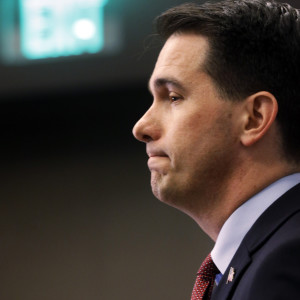Poor Scott Walker. There’s nothing like a competitive presidential campaign to shred the hopes of a candidate who looks good on paper.
The second term Wisconsin governor surged to the front of the Republican pack early in the year on the wings of his home state re-election bid and a strong speech to Republican Iowa activists in January. Walker attracted enough attention, staff, and generous supporters in the early going to make him seem like he was in for the duration.
There were some summer warnings that Walker might not be able to muster some of the elements of the magic that keeps a candidate in contention while taking up residence in the meat grinder that houses the modern presidential campaign stage.
The poor bloke did not seem to know much about the wider world beyond Wisconsin. While it’s helpful to be able to point to a record at home, it’s more important to convey some lofty thoughts on issues that have nothing to do with public employee labor fights in Wisconsin, like terrorism and the economy.
Note to candidates: Get a subscription to The Economist. You can read it when you have a break between issue seminars and fundraising marathons. It’s never bad to have a nodding acquaintance with the latest developments in Myanmar (formerly known as Burma). If pressed, you’ll have some knowledge of the recent tumult among Australia’s ruling party, the Liberals. You knew about that, didn’t you?
Walker also suffered from the strange phenomenon of appearing to shrink with exposure to the nation. He did not make much of an impression in the August debate that was broadcast on Fox. Befuddled is never a good look. Walker’s support dwindled, especially in crucial Iowa, where he had decided to make his stand.
The CNN debate last week was worse for Walker. He performed the unusual trick of nearly disappearing from his perch near the center of the crowded stage. This is a season of stampedes in presidential politics. Most voters do not feel a firm commitment to any candidate. They are looking over what’s on offer in a crowded lot. So much is based on so little. The faithful have no qualms about moving their affection of the moment from one candidate to another because nothing so binding as a vote is approaching.
When Walker registered a thunderous zero in the most recent CNN poll, fundraisers began to look for alternatives. There is no sentimentality among the growing crowd of big donors who possess outsize influence in both parties. They are a practical lot who operate in a rough marketplace. They want to be with a winner who shares some of their beliefs. When Walker suddenly started to smell like a loser, the big money donors and bundlers started looking for new candidates.
On Monday morning, a Walker fundraising committee call drew sparse attendance. With the current fundraising quarter ending on September 30th, Walker’s money troubles would soon be made public. The flight of the donors would grow more obvious. Snagging these megadonors has become a fierce, public competition among candidates. It’s news, bad news, when they start to defect. Rivals, of course, look to exploit the reversal of fortune.
The fundraisers provide a candidate with a dose of reality that staff and consultants may want to avoid. The hired help have an interest in keeping the candidate in the race and their paychecks and fees coming in until the last dollar is gone and the candidate staggers from the race.
Full marks to Walker for seeing where his campaign trail was leading: humiliation. He enhanced his dignity and won some respect for eschewing the magical thinking that can blind an otherwise sensible politician.
Walker may have made his most important contribution as he announced the suspension of his campaign in order to save the party and the nation from the unspeakable bully, Donald Trump, though he did not put it in those words. Suddenly, Walker looked substantial again.

